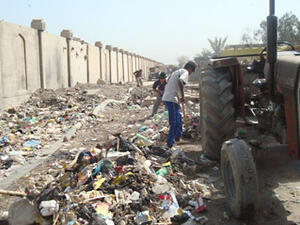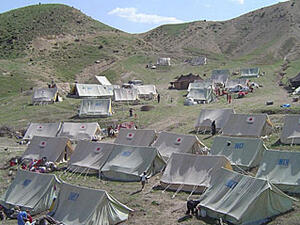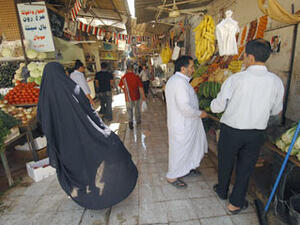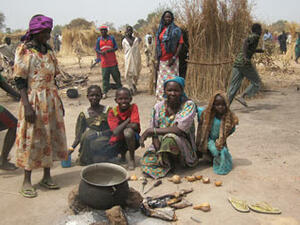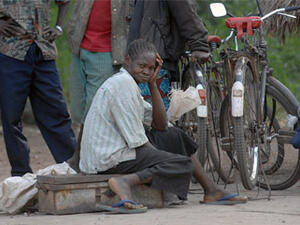Iraq: Mortar attack targets Baghdad Palestinians
Iraq: Mortar attack targets Baghdad Palestinians
UNHCR has repeatedly expressed concern about the many threats faced by thousands of Palestinian refugees in Baghdad and along the borders with Syria and Jordan. Now we have been informed that a mortar attack last night in Baghdad's Palestinian neighbourhood of Al Baladiya left four Palestinians dead, a dozen wounded and many people displaced. Some of the wounded are in serious condition. Ambulances trying to reach the area right after the attack were reportedly turned away by armed militia.
There had been previous warnings by militia that Palestinians should leave the neighbourhood. The Al Baladiya area used to house some 8,000 Palestinians. Reports by Palestinian sources now say that there are about 4,000 remaining there.
In 2003, UNHCR registered 23,000 of an estimated 34,000 Palestinians in Iraq. We believe about 20,000 of them remain in the country. They haven't had much option, and we are extremely concerned over the plight of those remaining, and the inability to provide them with protection. It is the responsibility of the Iraqi government and the coalition forces to provide the necessary protection, particularly of refugees in Iraq who have no alternatives for protection in other countries.
With this latest incident, it is now very possible that we will see more Palestinians trying to leave for surrounding countries, primarily Syria and Jordan. This worries us because both of those countries have closed their borders to Palestinians. There are already some 340 Iraqi Palestinians at the Syria-Iraq no-man's land hoping to enter Syria. They began arriving at the border in May 2006 and their numbers have steadily grown since then. And there have been numerous reports of Palestinians being turned away altogether from the border.
We strongly appeal to neighbouring countries to keep their borders open for Palestinian refugees from Iraq, and to extend once more, in this holy month of Ramadan, the customary generosity and humanitarian concern that could provide safety to Palestinians under threat. Syria and Jordan alone should not be expected to carry the entire burden, and we appeal to other Arab countries within and outside the region to accept some of those who feel compelled to flee Iraq.
It is now urgent that international support and goodwill are found to bring at least a temporary solution for Palestinians from Iraq. UNHCR has already tried several possibilities to no avail, including entry to Jordan and Syria; return to the Palestinian territories, with permission of Israel; relocation to other Arab states; and resettlement outside the region. At the same time, we continue to advocate for better protection of the Palestinian community inside Iraq. But under the present circumstances, return to Iraq is no option unless security is restored. Right now, it's an untenable situation for the Palestinians and it appears to be getting worse.
On another issue, some of you asked last week whether we had an estimate on the number of Iraqis displaced internally since the fall of the previous regime in 2003. Using figures from several sources, our Iraq unit estimates 754,000 Iraqis have been internally displaced since 2003 - some 365,000 of them just since February in sectarian violence sparked by the Samara bombings. We remain extremely concerned about the rapidly deteriorating situation in Iraq and the ongoing displacement this is creating both inside and outside Iraq. As mentioned last week, figures from the government of Iraq, UNHCR and its partners, indicate that more than 1.5 million people are presently displaced inside Iraq, including some 800,000 who fled their homes prior to 2003, as well as the 754,000 who have fled since. An additional 20,000 people are presently estimated to be temporarily displaced, awaiting the end of military operations in their towns and regions. As stated last week, another 1.6 million Iraqis are in other countries in the region, mainly Jordan and Syria. Many have been outside Iraq for a decade or more, but some 40,000 Iraqis are now arriving in Syria alone each month. Most of them do not register with UNHCR, however.
We have also been asked about some recent media reports involving the flight of Iraqi Christians. UNHCR has not seen an increase in Iraqi Christians arriving and registering in neighbouring countries. In Syria, the proportion of Iraqi Christians who have registered with UNHCR over the past six months has decreased. Presently, about 24 percent of the total 38,000 Iraqis now registered with UNHCR in Syria are Iraqi Christians. Between October 2003 and March 2005, that proportion was much higher - about 36 percent of the 15,855 Iraqis who were registered at that time. It should be noted, however, that most of the displaced Iraqis living abroad are not registered with us and we therefore do not have specific data on their ethnic and religious composition. In any case, the situation of Iraqi Christians is not improving. While much of the hardship and harassment they reportedly face is symptomatic of the general insecurity and violence in Iraq, members of the Christian minority in the past have been specifically targeted, with documented attacks against churches, the forcible closure of Christian-owned liquor stores and other forms of harassment.
In October, a priest was killed in Mosul.

